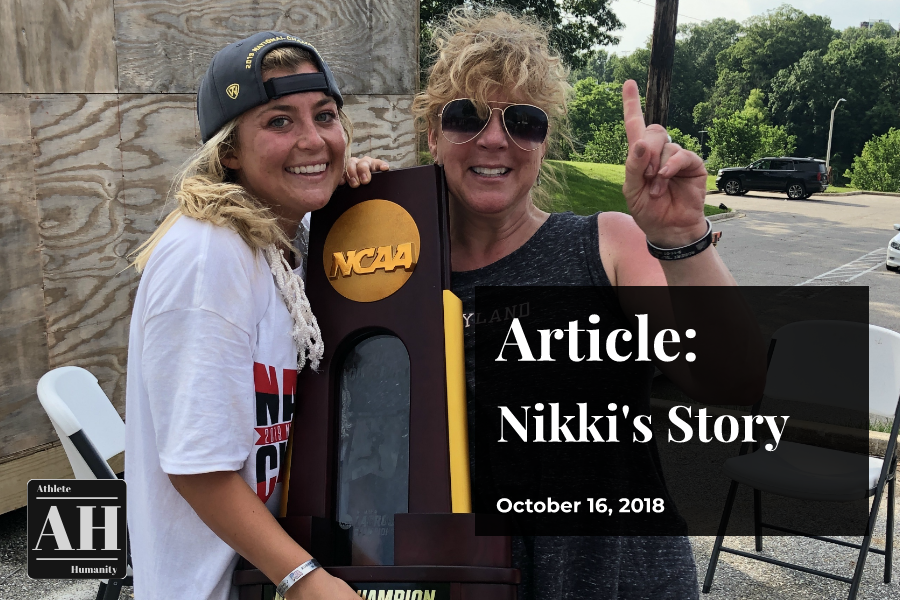Nikki Sliwak
October 16, 2019 — Nikki Sliwak
Nikki's Story
Have you ever felt like you were on a continuous roller coaster? A never-ending ride of ups and downs, crazy loops, going forward to just go backwards? Well, that is what my life is like dealing with depression and anxiety. Yes, I said it, I am a D1 athlete, 2-time national champion, and I suffer from depression and anxiety.
My life on this roller coaster started off with an upside-down loop. When I was3 years old, I lost my dad in the terrorist attacks on September 11th. Being soyoung, I do not remember a single thing. I do not remember the day, the weeks, or even a few years after the tragic day. Biggest thing of all, I do not remember my dad. I only had 3 short years with him. Little did I know at 3 years old, just how much this would dramatically affect the rest of my life.
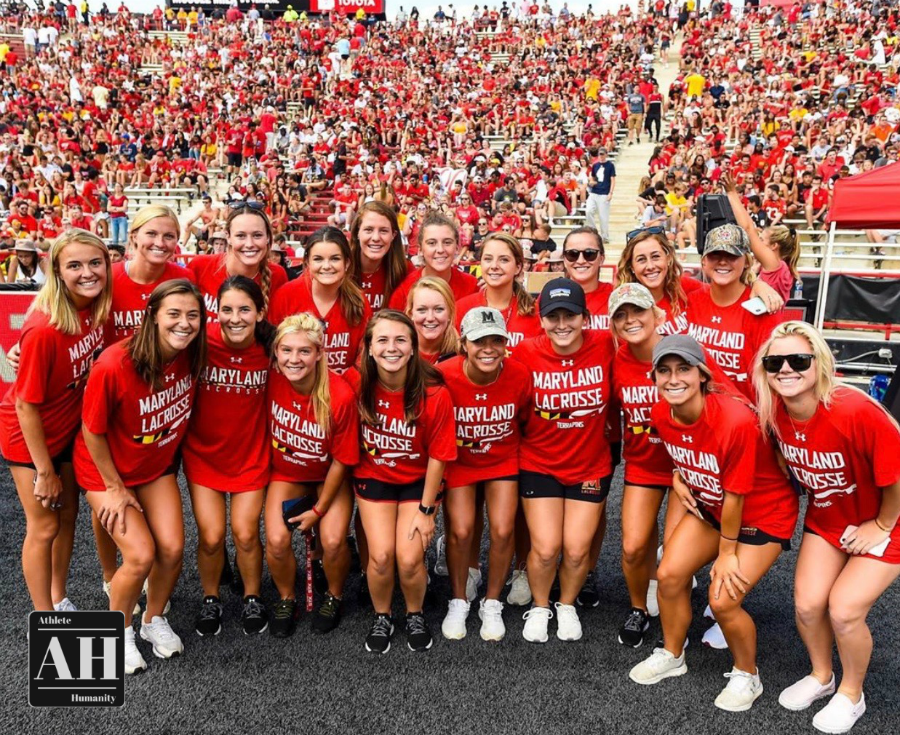
Sports has been a big thing in my family. My mom and my dad both played, and loved the competition. There was no doubt my brothers and I would follow in their footsteps. I watched my older brother channel the loss of our dad into sports, so as I grew older, I did the same. Sports was an outlet for everything I was feeling inside. Every emotion of anger, sadness, yet joy, excitement, and happiness I had. Sports was a way for me to connect with my dad. Playing lacrosse, soccer, and basketball my entire life was my high on this roller coaster ride. My mom coached me since I was so little and it was a great way to bond with her and my dad.
I started to experience the feelings of depression in middle school. Middle school and high school were an extremely tough time in my life. I played varsity sports for lacrosse, basketball and soccer when I was in 8th grade. Right away that started problems. I had lost many of my best friends prior to middle school drama, and making varsity only added to that. My friends were older girls on the team which made it hard for me when they graduated. At this time I started to struggle with PTSD from losing my dad. Going into high school only continued my downward fall on this roller coaster.
During my high school years, I had felt everyone was against me. I spent a lot of the years trying to fit into certain groups, being someone, I was not. I would be so upset over not being invited places with people I did not even enjoy being around. I wasn’t confident with who I was as a person, only as an athlete. More than ever I was missing my dad. The hardest part was, what was I even missing? I was missing this person I did not even know. As I got older, the less and less I remembered. During my sport games, I was watching dads stand on the sideline together wishing my dad was there. My high school was a tough community of competitors. Instead of cheering on the team, parents cheered on their own kids, silently wishing the other kids would fail. The kids on the team silently did the same. I felt as if the only true person cheering on my success was my family. I would have episodes of depression throughout the years and I would just break down in silence. There would be times I would just uncontrollably cry, not able to stop myself. I would be sad and I did not even know why. I hated that I was different and no one else had this problem. Coaches viewed me in a completely different way than what I really was. Because I kept my focus and drive inside, I came off as selfish and rude. I was very hard on myself and would really take it hard when I made a mistake, but coaches viewed that as I only cared about myself and how I was playing. Many did not see that I was so hard on myself and so focused, because I was playing for something bigger then myself, my dad. They did not see this drive inside me was because I wanted to make him proud. It drove me to a place of reaching for perfection, when that did not exist. Depression made me internalize everything I was feeling and came off in a different way than most people saw. I never spoke about it, never once did I mention to anyone what was really going on. Only in the 4 walls of my house really knew what was going on, and what I was dealing with.
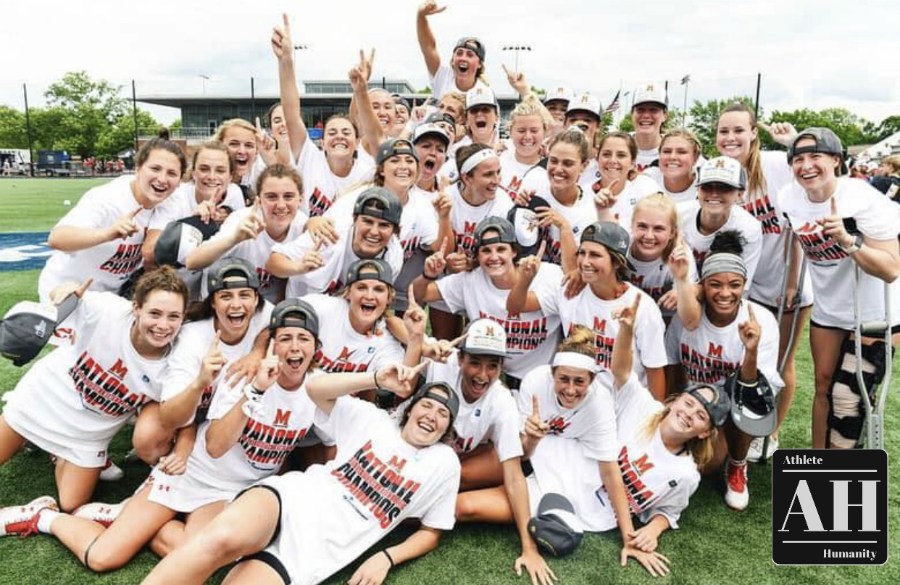
In 10th grade I developed an eating disorder that lasted for a few years. Yes I’ll say it again, an eating disorder. I became anorexic. I would not eat, and when I did eat, it was the tiniest amount to make the people around me satisfied. It wasn’t a body image thing, it was a way for me to control what was going on in my life. I couldn’t control the people around me, I couldn’t control how they viewed me, I couldn’t control not having my dad, I could however, control what I was eating and how much I was eating. I decided to become vegetarian, but took it to the extreme. I also became obsessive about working out. I would run miles after practice, or take CrossFit classes religiously. I would breakdown if I couldn’t workout. The combination of being anorexic and being overly obsessive with working out, was certainly not the best combo. It showed in my sports. I became slower and I became weaker. My mom would yell on the field “you’re doing the 500 pound jog again.” She used this phrase to let me know I was running as if I weighted 500 pounds, that’s how slow I became and boy was she right. I would fall over when someone lightly pushed me on the field. I dropped to 100 pounds, and the sad thing was, I was so proud of myself. So proud that I dropped that many pounds because I was, “taking control of my life”. I became a different person. My mom and I were constantly fighting because she was trying to get me to eat. My friends were watching every move I made reporting back to my mom. It was a very viscous cycle. A few times I ran away to my friend’s house when the fights got bad. I knew my mom was right, I knew I had a problem, but I did not want to hear it, so I ran. Working out was the only thing that made me feel good. I did not realize how badly the combo of not eating enough, and working out truly affected me. I finally came around when I felt like I couldn’t play my sports anymore. When I was really having a hard time on the field, constantly being tired all the time, I knew I had to change.
I got recruited to the University of Maryland to play lacrosse. This was the high on my roller coaster of a life. Maryland was my dream school ever since I was in 4th grade. Lacrosse is the sport I fell most in love with and wanted to play there in the worst way possible. Being at Maryland now, I absolutely love it. I love the friends that I made for life, and I love the school. College however, is where my depression also became high anxiety. As high as I got going to attend Maryland, is as low as I got. The lacrosse aspect of college did not go exactly as I had planned. I was used to being the super star, the go to player, the one the team needed on the field, to riding the bench. Never in a million years did I see myself as one of those players that did not play. From not playing, to dealing with college classes, assignments and homework, meeting all new people, and being away from my mom and family, put me into a very deep depression my freshmen year. I developed anxiety, and started to worry about every little thing. Everything in my life caused me anxiety. I was depressed and dealing with anxiety without a single person knowing at school. The anxiety then crept into all aspects of my life. Once again I internalized everything. I never drank in high school, and I sure made up for that in college drinking my problems away a few of the nights. In return my skin became the worst it had ever been, breaking out like I never did before. This only sent me in more face first into a low. I would be up until 4 am some nights because I could not sleep. Some nights I was up all night. I would think about every decision, every movement I had made that day. The anxiety got to a point I was having panic attacks and I could not control them. Some nights I had to leave and go home because I could not get the panic attacks under control. I became so bad that I started to make myself throw up. The anxiety was so bad that I needed a way to release it. That feeling of hopeless and frailness was what I felt when I made myself vomit, so I was reinforcing how I felt on the inside. This might have been the lowest I have ever been.

I became so low because I had let my mind take over my entire world. Every step I took I thought about. Every word I said I thought about. Every shot I took on the lacrosse field I thought about. Everything in my life I thought about. I became so overwhelmed.
At the end of my sophomore year, I made the decision to go on an antidepressant. Why it took me so long to do this, well I will tell you. I thought I would view myself as weak if I did. I thought if I gave into the medicine, the monster in my head won. I did not want that feeling of that thing inside my head to win. I didn’t want to have to let people know I’m on medication for my depression and anxiety. I did not want to become dependent on this medication to determine my happiness. Little did I know how it would change my life. I was able to work on myself first and not let the depression and anxiety have as big of a part in my life. My mom once said this line to me that stuck, “someone who is diabetic is not, not going to take their insulin, so someone who deals with mental illness, a different illness but still an illness, needs to do the same.” My twin brother was dealing with similar problems and I saw the difference the medicine made for him. He was the one to show me the bigger picture and if he could do it, I could do it. I realize I did not need to be on it forever, but it was a first step of help.
Slowly but surely I made a commitment to myself to get better each and every day. I started to change my mind set, and find ways to release the anxiety and not allow myself to spiral into the deep depressions. I started to change the words I was feeding myself from negative to positive. I started to control what I could and left what I couldn’t for the universe to figure out. I could control the effort I put it, how hard I work, what kind of teammate I was, what kind of daughter and friend I wanted to be. I was so tired and so sick of feeling unhappy. The thing is, it’s a process and it’s something that takes time. I realize the little steps matter. This past summer, going into my senior year, I did the one thing I never did my entire life. I focused on training the one muscle and biggest part of an athlete there is. I trained my mind. I put my stick down and did not pick it up until August. I had no school work or assignments to worry about. I trained my body, and I trained my mind and my thoughts with it. I feel better than I ever have in this moment.
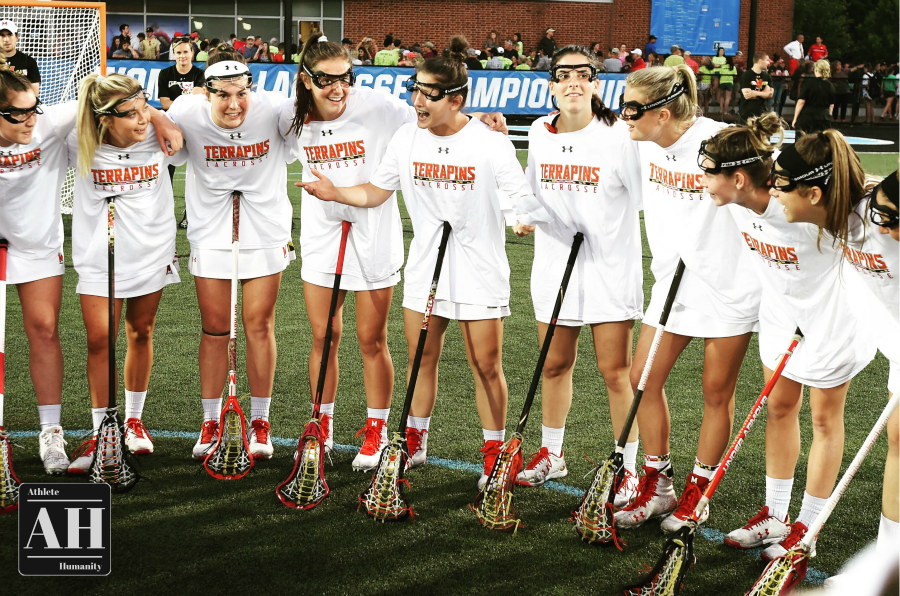
This story took me 6 months to write. 6 months of writing and deleting. 6 months of collecting my thoughts and reflecting on my life. It wasn’t easy but it was necessary for just that one person who reads it. That one person this hits home with and can relate to. I share my story today to change minds of people who are struggling in silence. I share because I want people to know what I have learned being an athlete who struggles with mental illness. Mental illness is real. Mental illness is not something to be scared of, but something to embrace. I have learned that to be a successful athlete you, you cannot compete at your highest level, if your mental health and mind, are not taken care first. You as a human is the most important thing to being an athlete. I have also learned that you cannot judge your self-worth on your sport. If you judge your self-worth on how well you play and how good you are as an athlete, you will not get far. I did that for many years, and beat myself up over it. Sports are a place to have fun and grow. It is not to define you as a person, rather sports are a place to help shape you as the person you want to be. I want to be a hard worker that never gives up no matter what the situation is. I have learned that dealing with depression and anxiety does not make you weak. It does not make you weak asking for help when you need it. I have learned mental illness as an athlete adds an extra obstacle to my training, but that is an obstacle I am willing to compete against to work and overcome every day.
P.S: I just wanted to thank my amazing mother for being the most incredible person. My mom has been there, every step of the way through my journey. She has been the most supportive, caring, and loving human being one can be. She has been there to talk to me through my lowest of lows, and my cheer me on through my highest of highs. She has been my biggest cheerleader, best friend, and therapist when I need it. I would not be where I am today without her, and I and so thankful to have such a strong and fierce role model in my life.
Nikki Sliwak
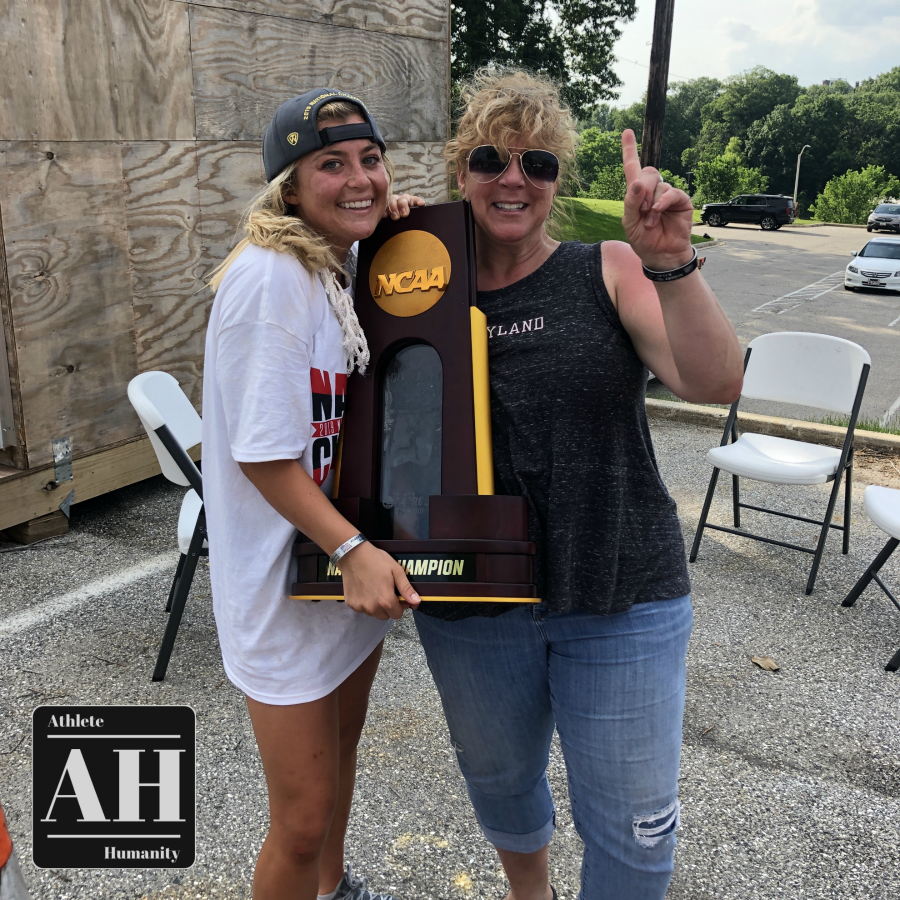
I have built this platform because I understand that although our experience with mental health may be different, the weight of the burden upon countless shoulders is often the same. I have seen college athletes who get caught in their own personal cycle of negative thinking. I didn’t have a place to turn to, to let me know I wasn’t alone, or a place to simply tell my story the way I wanted it to be told, separate from the influence of the overbearing feeling of the stigma. Most importantly, I have been a victim of thinking that a true testament of resiliency can only be achieved by overcoming this battle on my own.
We have always been told that there is life at the end of the tunnel. However, it becomes overwhelming when we feel like when we are never going to get there. The goal of this platform is for you to share your story, and to help establish a community where it is no longer a lonely journey to find that light; but rather helping you realize the light comes from within you and what you have been willing to endure. What I hope to gain from this platform is a community that shifts the focus away from finding the light at the end of the tunnel, and realize that collectively we can work towards illuminating our own path.
Athlete Humanity was created to show the human side of college athletes. This is done through you, and by you no longer being held down by the silence you were told to keep, and by sharing your story for how it truly is; unfiltered, unadulterated, and unguarded. Together the community created through Athlete Humanity will help to develop a new narrative surrounding mental health that is driven by the athletes who are enduring it.
